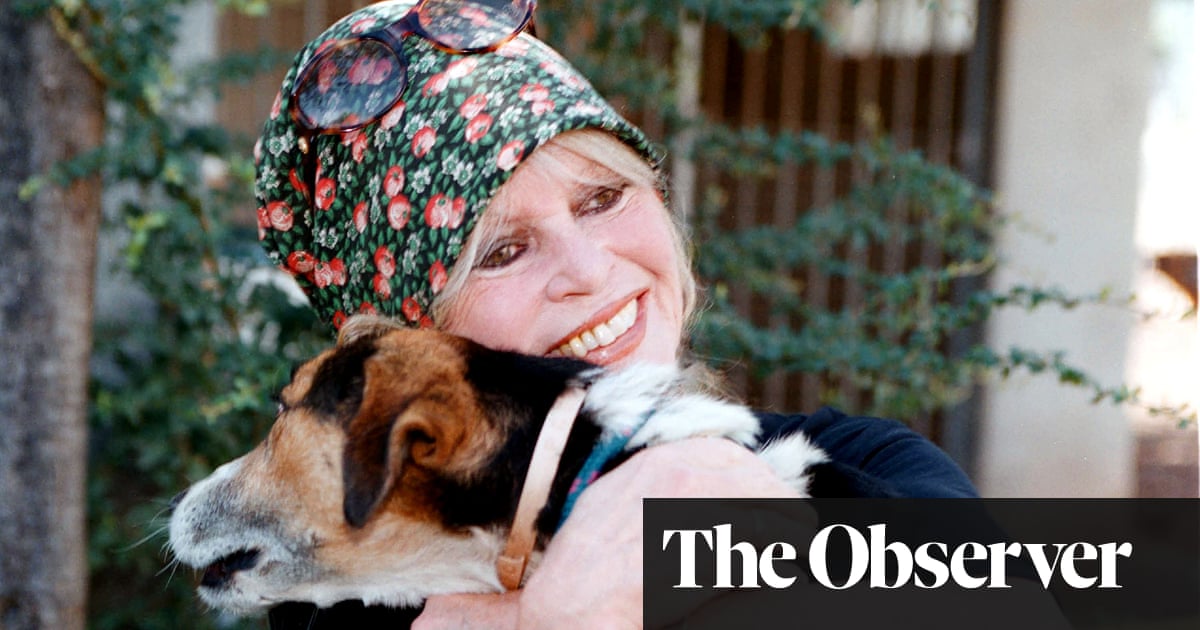
few days before New York locked down and Broadway closed indefinitely, Rose Byrne was on stage in Brooklyn, doing Medea. It was a sold-out run, co-starring her husband, Bobby Cannavale, in an updated version of the Euripides classic. Already, in that first week of March, people were starting to not show up, and those who did were in an odd mood. “There was something subdued about the audience,” says Byrne. “I mean, it’s Medea – and not Tyler Perry’s version – so it’s not full of laughs.” Still, she says, “the last week was strange. You could feel a tension.” The show closed on 8 March, one of the few in the city to finish its run. Four days later, the theatres went dark.
Since then, the 40-year-old actor, along with Cannavale and their two kids, both under five, have been in their home in Brooklyn. Byrne peers into the camera from a dimly lit room in her house, hair tied up in a wrap that conceals what she says is the crash in personal grooming. There is, in these times, nothing so endearing to other New Yorkers as the New Yorker of means who, at the first sign of the pandemic, didn’t clear off to their house in the country. “We’ve taken some weekend trips here and there,” says Byrne, “but otherwise we’re holding tight and waiting to see… ” She trails off. The inertia of lockdown descends.
Luckily, the new TV show Byrne is promoting is an invigorating effort that lifts the spirits even as it depresses. Mrs America, in which Byrne plays Gloria Steinem, is an ensemble piece set in 1972, at the height of the women’s movement in the US. For a moment, it looked as if the equal rights amendment or ERA – a proposed change to the constitution, seeking to guarantee women equal rights across the board – might be ratified by all 50 states. What followed was one of the epic disappointments in feminist history, a period characterised by infighting within the movement, and betrayal, chiefly by the 1972 Democratic candidate for president, George McGovern. Having given Steinem his assurance he would adopt abortion rights as official policy, he quietly dropped the position and did no such thing.
It’s a tough role for Byrne in some ways. Her co-stars play flamboyant characters: a brilliant Margo Martindale is Bella Abzug; Tracey Ullman chews the furniture as Betty Friedan; the show belongs to Cate Blanchett as Phyllis Schlafly, the conservative wrecker of the ERA. But Byrne, as Steinem, has to communicate the soft-spoken power of someone who, as she puts it, “never raises her voice, or loses her temper. There’s an incredibly serene quality to her. But it has a real power. She’s actually very tough, and has a steeliness underneath.”
Steinem’s steeliness was deployed not just in opposition to enemies of the ERA and their Republican backers, but to rivals within the women’s movement – chiefly, Friedan. As Nora Ephron famously characterised it at the time, Friedan despised the younger Steinem and fumed at how she pulled the spotlight away from her. “It’s her baby, damn it,” wrote Ephron of Friedan, in Esquire. “Her movement. Is she supposed to sit still and let a beautiful thin lady run off with it?”
That essay, somewhat clunkily referenced in the episode focusing on Friedan, is a harsher take on the characters than the show adopts. Mrs America, created by Dahvi Waller, a graduate of Mad Men and Desperate Housewives, does not, as Byrne says, “shy away from the infighting”, but it does have a pious air that at times buries the drama beneath a lot of strained sloganeering. “This is our Vietnam,” says Steinem at one point, trying to impress the seriousness of her cause on a male politician. “I didn’t get anywhere in this life waiting on someone’s permission!” says Uzo Aduba as Shirley Chisholm, the first black woman elected to Congress, who stood as a candidate in the 1972 Democratic primaries.
Byrne’s performance is good enough to rescue most of her scenes. Her range, over the past 20 years, has accrued her a reputation as a reliably excellent performer, through roles as diverse as the author heroine in The Immortal Life Of Henrietta Lacks, the affable mum in the good but appallingly titled Instant Family, with Mark Wahlberg, and as the Russian villain in Spy, with Melissa McCarthy.
And if not even Byrne could rescue the awfulness of James Corden’s Peter Rabbit franchise, it’s hard to hold it against her. As a performer, there is something very likable that has to do with a quietness in her acting that overspills into life. I remember talking to her almost 10 years ago on the release of Bridesmaids, a breakthrough movie in which she played the stuck-up one, when she said she found the cut and thrust of Hollywood baffling: “I struggled when I was younger with other actresses who aren’t friendly and are very competitive. I would go, ‘OK, you win, I’m not a threat’.” This is not, it is safe to say, the standard line in an industry in which feminism can mean being as much of an arsehole as the men.
Byrne’s own feminism, she says now, grew out of the example set by the women in her family. She was raised in a suburb of Sydney, where both her parents worked, her mum in a primary school, her dad as a statistician. “My aunts worked, my grandmother worked,” she says. “They were all working women. Feminism was something I probably didn’t get educated about until my late teens, when I remember stumbling across The Feminine Mystique – my huge introduction was reading that book. From there I did gender studies at college, starting at ground zero with all those fancy writers and the idea of dismantling gender norms.” After graduating with an arts degree from the University of Sydney, she moved to New York and joined the Atlantic theater company, and her career began.
There is a diligence about Byrne that was revealed recently in an agonising portion of Jimmy Fallon’s late-night talkshow, in which Byrne, over Zoom, was shown making a whisky-based cocktail very, very slowly, following the measurements to the letter. “I’m a stickler,” she says, and she applies that attitude everywhere. In preparing her role as Steinem, she researched widely, “reading, looking at footage, discussing with Dahvi what to bring to light”. Byrne has never met Steinem, who wasn’t involved in the show, and found the experience nerve-racking. “It’s hard when someone is still so active, and so present – trying to honour that, and also give a portrait of her.”
Some of the best parts of the show – apart from Blanchett’s campy scenes – are when it turns its attention to shortcomings within the movement, particularly its racial bias towards white women. It has been rightly pointed out (by critic Doreen St Félix in the New Yorker) that the least well-drawn character is Shirley Chisholm, though Aduba does her best with a lot of empty, dutiful lines. But the show has a few other, more illuminating things to say about race. In one scene, set in an editorial meeting in the offices of Ms magazine, the sole black writer present tentatively brings up doing a piece on the dangers of tokenism, to be met with blank stares all round. “You don’t mean us?” says one of the white characters, and the woman is forced, weakly, to say no. As Byrne says, “intersectionality wasn’t even a word yet”.
The depressing thing about many of the issues raised in the show, from abortion rights to division of labour within the home, is that they are still raging today. A week or so earlier, the New York Times carried a piece in which a survey revealed that, under lockdown, nearly half of men said they did most of the home schooling, while only 3% of women agreed. At the start of the pandemic, some states in the US moved to limit abortion rights as “non-essential” treatment. “You understand why feminists are furious,” says Byrne. “We’re still talking about this? My God. When you realise, doing it – we’re sitting around on the set and still talking about the same thing. It was very upsetting at times.”
Byrne and Cannavale’s children are too young for school; the older one, her four-year-old son Rocco, does a weekly Zoom preschool class that, she says, inevitably descends into chaos. The couple met in 2012, on the set of Annie, the remake, and have since worked together multiple times (Cannavale was also in Spy, and in 2014 they made a comedy called Adult Beginners). They are an odd couple in some ways; Cannavale, who most recently starred in Martin Scorsese’s movie The Irishman, and is a veteran of the TV show Boardwalk Empire, is from Union City, New Jersey, and as a performer is as raucously energetic as Byrne can be watchful. When she was making the cocktail on the Fallon show, Cannavale was filming her on his phone and being driven insane by her precision and delicacy.
The time at home, she says, has been a boon to them both. Before now, it has been rare for the couple to be in one city for long, unbroken periods of time. They travel frequently to Australia – where they are due to perform in a production of Arthur Miller’s A View From The Bridge in Sydney at the end of the year – while Mrs America filmed in Toronto. It was a fun summer shoot, says Byrne, with a sorority of cast members that held firm after shooting ended. It reminded her of the vibe on Bridesmaids, which was written by and starred mostly women. “In both cases, there was an anticipation, most days, when you’re all together doing these big scenes – how fun that is, and such a pleasure. Not every job is like that.” Since lockdown began, the cast of Mrs America have done group Zooms and remained friends, while they each wonder how and when they will work again.
For Byrne, there is relief in the fact that she finished her run in Medea, the most testing role of her career. But it has been unbearable watching Broadway close down. “Bobby’s lived here for so many years, and it’s breaking his heart, seeing the theatre and how affected that community has been. Such a huge employer of so many people in New York, and so many of them our friends. He knows many people who’ve been ill – people who’ve recovered, and haven’t recovered. It’s very real.”
Life continues, oddly. “I just had a shower. At 1pm,” says Byrne, raising a hand absent-mindedly to her head. “I look crazy.” But she is grateful for the time she’s getting to spend with her kids, and for being healthy and at home. After our conversation, she has a couple more Zoom commitments. And then, like everyone else at the moment, “It’s just a question of when I start drinking.”
• Mrs America will screen on BBC Two in July












